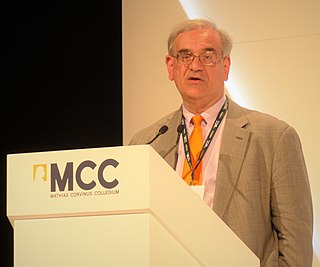Цитата Эдварда Конарда
В 1950-х и 1960-х годах бурный рост крупных корпоративных рабочих мест в сочетании с ограниченным предложением рабочей силы привел к здоровому росту заработной платы.
Связанные цитаты
Когда пресса пишет пугающие истории о том, что глобальное предложение рабочей силы истощает рабочие места из богатых в бедные места, эта история обычно представляется как «гонка на выживание» просто с точки зрения заработной платы. Капитализм якобы ищет рабочую силу там, где она самая дешевая. Эта история наполовину неверна. Также действует своего рода культурный отбор, так что рабочие места покидают страны с высокой заработной платой, такие как США и Германия, и мигрируют в страны с низкой заработной платой, где работают квалифицированные, а иногда и сверхквалифицированные работники.
Сдерживая предложение рабочей силы на низком уровне, иммиграционная политика имеет тенденцию поддерживать высокий уровень заработной платы. Подчеркнем этот основной принцип: можно ожидать, что ограничение предложения любого вида труда по отношению ко всем другим производственным факторам повысит его ставку заработной платы; а увеличение предложения, при прочих равных условиях, приведет к снижению ставок заработной платы.
Поскольку наемному плательщику выгодно платить как можно меньше, даже хорошо оплачиваемый труд будет иметь не больше того, что считается в данном обществе разумным уровнем существования. Рабочие низших разрядов обычно имеют меньше, и если бы государственная помощь предоставлялась хотя бы до уровня заработной платы рабочих самых низких разрядов, эта помощь конкурировала бы на рынке труда; остановить или исчерпать предложение наемного труда. Это привело бы к тому, что выполнение работы наемным работником стало бы излишним.
К сожалению, реальная минимальная заработная плата всегда равна нулю, независимо от законов, и это заработная плата, которую получают многие работники после введения или повышения установленной государством минимальной заработной платы, потому что они теряют работу или не могут ее найти. когда они входят в состав рабочей силы. Запрещение оплаты меньше определенной суммы не делает производительность работника равной этой сумме, а если это не так, то этот работник вряд ли будет нанят.
Ведущий исследователь деловой пропаганды, австралийский социолог Алекс Кэри, убедительно утверждает, что «20-й век характеризовался тремя важными политическими событиями: ростом демократии, ростом корпоративной власти и ростом корпоративной пропаганды как средства защиты корпоративной власти от демократии.
Закон о минимальной заработной плате — это «Народная Федеральная резервная система». Привяжите минимальную заработную плату к денежной массе. Если есть противодействие этой идее, тогда закройте ФРС и ее способность искажать экономику, наказывая труд, или сделайте искажения ФРС доступными для всех предприятий и всех работников.
Мне посчастливилось вырасти в 1940-х и 1950-х годах. Когда я занялся бизнесом в конце 1950-х и 1960-х годах, Америка только начинала становиться великой индустриальной державой. Это позволило молодым предпринимателям запустить свои двигатели, начать свой бизнес, занять немного денег и использовать то, что у них было.
Что ж, работа — это прекрасно. Вы должны быть немного осторожны: если вы повышаете минимальную заработную плату, вы поощряете замещение рабочей силы, и вы собираетесь покупать машины и автоматизировать вещи — или создавать рабочие места за пределами этой юрисдикции. И поэтому в определенных пределах, вы знаете, это приводит к сокращению рабочих мест. Если вы действительно начнете настаивать на этом, то вы просто пойдете на огромный компромисс.
Консервативной целью была третья миризация Соединенных Штатов: все более неполная занятость и низкооплачиваемая рабочая сила; небольшой, но растущий денежный класс, почти не платящий налогов; приватизация или ликвидация сферы услуг; ликвидация государственного образования для малообеспеченных людей; ослабление ограничений в отношении детского труда; экспорт промышленности и рабочих мест в страны с низкой заработной платой и свободной торговлей; распад профсоюзов; а также отмену правил и правил охраны труда и окружающей среды.

































